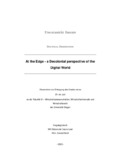Citation link:
http://dx.doi.org/10.25819/ubsi/10382Files in This Item:
| File | Description | Size | Format | |
|---|---|---|---|---|
| Dissertation_de_Castro_Leal_Debora.pdf | 2 MB | Adobe PDF |  View/Open |
| Dokument Type: | Doctoral Thesis | metadata.dc.title: | At the edge - a decolonial perspective of the digital world | Other Titles: | Am Rande – eine dekoloniale Perspektive der digitalen Welt | Authors: | de Castro Leal, Debora | Institute: | Fakultät III - Wirtschaftswissenschaften, Wirtschaftsinformatik und Wirtschaftsrecht | Free keywords: | Decolonial, Community network, Amazon rainforest, Pericapitalism, Capitalocene, FARC, Entkolonialisierung, Gemeinschaftliches Netzwerk, Amazonas-Regenwald, Perikapitalismus, Kapitalozän, FARC | Dewey Decimal Classification: | 330 Wirtschaft | GHBS-Clases: | QGTX | Issue Date: | 2023 | Publish Date: | 2023 | Abstract: | Some places remain on the periphery of the World System (Wallerstein, 2004), participating in it but not fully absorbed by it. However, it is argued that there is almost no place in the planet in the 21st century left untouched by global capitalism (Moore, 2016; Moore, 2017). This dissertation delves into the economic life of two pericapitalist (Tsing, 2015b) community in the Amazon rainforest. One is a traditional rural village in the Brazilian Amazon region, caught between tradition on the one hand and modernity, coloniality and development on the other. The other is a community of former members of the Colombian guerrilla group Armed Revolutionary Forces of Colombia - Popular Army (FARC-EP), who are faced with the difficult task of building a new economic, political and social life for themselves after the peace agreement, and build relations with the modern world system they have formerly been in armed rebellion against. Through ehtnographic inquiries into the practices of the community members, the dissertation details how these two distinct rural Latin American communities meet the spread of the capitalist world system and manage their positions in relation to it. It pays special attention to the role of digital technologies, like mobile phones and internet, in these processes. To make sense of the practices of these communities, it engages with conceptual and analytical tools and theories that attempt to explain the global situation, including decolonial theory and the concept of coloniality/modernity, Immanuel Wallerstein’s World System Analysis, and Anna Tsing’s concept of Pericapitalism. I aim to describe what can be done about this global condition that decolonial writers address, by combining these ideas with ethnographic description, and outline specifically what it means for the interventions of HCI activists-scholars and designers. The contribution of the thesis is as follows: Firstly, it provides a detailed analysis of the material practices of two communities at the edge of capitalism. These include a wide variety of economic practices, but also political and social practices. Secondly, it draws attention to the heterogeneous nature of responses to global capitalism, formed from the relationship between specific material practices, new technology and elements of cultural identity. Through the different practices, community members manage to keep their distance from aspects of the World System and globalised capitalism, even resist it, but seek closeness in other moments. Thirdly, building on my ethnographic study and my engagement with the concepts mentioned above, my thesis makes several conceptual contributions, appropriating existing concepts, which include a) the idea of counter-appropriation as a means to describe the practices of FARC-EP members to evade the appropriation of digital technologies against them by the national Colombian army, b) it builds on the idea of social capital to describe how how communities deal with the economic pressures of development (in the Brazilian case) and re-integration into mainstream modern/colonial society (in the Colombian case), and the supportive role of digital media, and c) it addresses lacunae in WSA and decolonial thinking by describing how colonliality/modernity and global capitalism actually spread and encountered by local specific communities, highlighting also the notion of resistance, which especially Wallerstein underplays. Fourthly, it argues for an increased sensibility towards these different relations to capitalism when considering design implications. Consequently, it indicates the need to investigate the economic assumptions contained in HCI initiatives, as well as inside ourselves as HCI researchers, as they might clash with the different ways in which local communities wish to relate to global systems. It argues that close attention to material practice goes some way towards resolving those tensions and, further, provides for an appeal to a more pluralistic views of culture and development (Escobar, 2018). |
DOI: | http://dx.doi.org/10.25819/ubsi/10382 | URN: | urn:nbn:de:hbz:467-25944 | URI: | https://dspace.ub.uni-siegen.de/handle/ubsi/2594 |
| Appears in Collections: | Hochschulschriften |
This item is protected by original copyright |
Page view(s)
543
checked on Mar 10, 2025
Download(s)
512
checked on Mar 10, 2025
Google ScholarTM
Check
Altmetric
Items in DSpace are protected by copyright, with all rights reserved, unless otherwise indicated.

